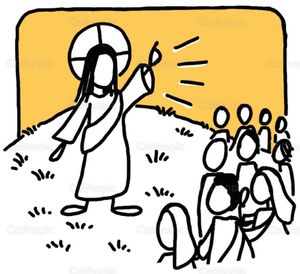Franciscan Fractals: “The Kingdom of God? Where?”
Contemplating today’s culture with Jesus and humility of St. Francis.
[And Job said] “If I go forward, he (God) is not there; or backward, I cannot perceive him; on the left he hides, and I cannot behold him; I turn to the right, but I cannot see him.” Job 23: 8-9
And Jesus said to them again, “Children, how hard it is to enter the kingdom of God!” Mark 10: 24
Job, the richest man in the East, was a good man who stayed faithful to God. Life was good; and then one day he was struck with one tragedy after another. Satan attempted to get Job to deny the goodness of God by afflicting him with multiple catastrophes. He lost his house in a fire. His animals were burned to death, his servants died, and his children were crushed to death. Job’s health was swept away, and he contracted boils that appeared on his body from head to toe. He became so sick that Job wished he had never been born. His wife withdrew her support telling him that he was foolish for believing in the goodness of God. Even Job’s closest friends urged him to curse God and die.
Prior to his tragedies, Job was a wealthy and healthy man. He was seen as being blessed because of his good thoughts and deeds. Job was presumably favored by God, because he was living a godly life. However, the story of Job was an attack on what we today call the “prosperity gospel.” The prosperity gospel holds to a belief that God rewards believers with wealth and health, and that faith through positive thoughts, actions, and charitable deeds can lead to financial success in today’s world.
In the midst of Job’s success, chaos struck in his life. He lost everything. Job experienced what we might call a “dark night of the soul.” He became so broken, that for him, God could not be found – not in front of him, not in back of him, not on his right or left side. God was not visible anywhere. Job exuded a feeling of utter abandonment and loneliness.
Six centuries later, Jesus would enunciate the words, “How hard it is to enter the kingdom of heaven.” Job experienced hardness, but he could not run from the changing realities in his world. Today, many churches and Christians are running from the hardness of what it takes to enter the kingdom of God. They are mired in the mud of the prosperity gospel.
Eventually everyone is confronted with the realization that material prosperity and health have nothing to do with good thoughts and deeds. A person cannot manipulate God into doing something good for one’s self or anyone else. God will do what God does; that is, to act out of unconditional love. The embodiment of unconditional love does not recognize doing something good for you because you did something good for God. God is not in the business of bargaining.
At some point in our lives, we will end up in a similar situation to Job. Our employment will fade away, relationships will change, we will age, our health will deteriorate, and friends will die. We will find ourselves more frequently alone. And, we may say, as Job did, “God is not there (or here) . . . God hides. I cannot behold God . . . I cannot perceive God.” We too will enter a “dark night of the soul,” and recognize, “how hard it is to enter the kingdom of God.” Even our most sacred beliefs and rituals may be challenged.
Despite his desperate state, Job refused to curse God and God’s goodness. He remained faithfully loyal to a God whom he knew was ultimately good and loving.
It is hard to enter the kingdom of God, because the kingdom is not made of this world. The kingdom is in this world, but not of this world. God does not deal in financial transactions, or rituals that fan our ego. The kingdom of God is found in steady faithfulness to God.
Finding the kingdom is not about you and I making an effort to hang onto God, but it is found in recognizing that it is God who hangs onto us even as we experience our own dark nights of the soul.
Peace now and forever,
Fr. John


